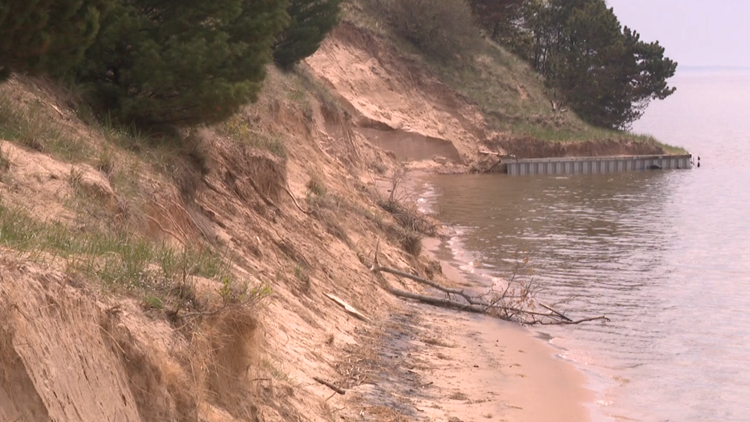GRAND HAVEN, Mich. — (Grand Haven Tribune) Lake Michigan hit an all-time high for the month of May, breaking the old record set back in 1986 by an inch.
The Big Lake is now 13 inches higher than it was at this time last year, causing erosion, wash-outs and significantly smaller beaches.
The federal government can manipulate Great Lakes water levels slightly, according to Christopher Schropp, civil engineer with the U.S. Army Corp of Engineers Lake Michigan Area Office in Grand Haven.
“The water levels for the Great Lakes are maintained by the International Joint Commission between us and the Canadian government,” he said. “They set the levels for the lakes. They can manipulate them to some degree with the amount of water that goes through the Niagara Falls and Chicago River.”
But in the face of near-record water levels, will they?
Not likely, according to Schropp.
“Even if they would start doing that now, we would not see any impact from that for a very long time (likely months),” he said.
As of May 24, the Lake Michigan water level measured 581.4, about four feet above the chart datum of 577.5. The chart datum is the level set by the International Joint Commission.
“That's what Lake Michigan should be for optimal purposes,” he said.
Lake Michigan has risen about nine inches since April 24.
Spring Lake is close enough that whatever happens with Lake Michigan also happens in Spring Lake, according to Schropp.
“The river is more affected by rainfall,” he said. “If we have a large rain, it will raise river levels and will raise Spring Lake as well. When Lake Michigan is higher, it backs the water up and the water table throughout the region is higher. There's no place for the water to go, so it just goes higher.”
The Army Corp Great Lake water level report released Friday projects the lake will rise another two inches by July 1.
By mid- to late-July, levels should begin to decline, about two inches per month during July, August and September. That is, if we don’t get struck by any serious rain events.
“The water levels on Lake Michigan are affecting some of the harbors and their waterways,” Schropp said. “Obviously they've got issues with the (Harbor Island) boat launch. Folks with their docks are underwater or close to being underwater.”
Schropp said he's received calls from a few property owners inquiring about sandbags. In order for the federal government to provide flood relief materials, local and county governments need to first work together and and exhaust their resources and a state of emergency needs to be declared.
“Folks that live on Lake Michigan are probably seeing some erosion,” he said. “There's a loss of property from high water levels on Lake Michigan. Folks on the river are probably experiencing some erosion, too. In Spring Lake, people's docks and yards are possibly being flooded.”
Schropp said the Army Corp is closely monitoring the situation.
“I think we're really waiting for July for the seasonal decline to happen,” he said. “If that doesn't happen, there will probably be some action taken. Obviously we're aware that it's going up. How much more will it go up?”
He cautions boaters to not become overly confident with deeper water.
“Things that used to be visible, like old pilings, are now below the water,” he said. “Make sure you boat safely and don't hit those obstructions.”
►Make it easy to keep up to date with more stories like this. Download the 13 ON YOUR SIDE app now.
Have a news tip? Email news@13onyourside.com, visit our Facebook page or Twitter.



